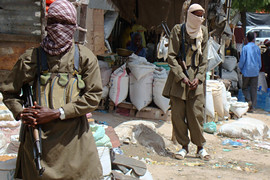
Somali resistance fighters kidnapped two French nationals acting as security advisers to the western-backed government. The Al-Shabaab Islamic organizations has seized control of large sections of the south and central regions of the country., a photo by Pan-African News Wire File Photos on Flickr.
Probe focuses on Canadian as Shabab leader of Somalia courthouse attack
Investigators believe Mahad Ali Dhore, who grew up north of Toronto, organized the nine-member assault on Mogadishu’s Supreme Court.
OMAR FARUK / REUTERS
By Michelle Shephard National Security Reporter, Published on Mon Apr 15 2013
As the death toll rises in Mogadishu following Sunday’s suicide bombings, Somali investigators are increasingly focusing on a Canadian who they believe led the multinational commando unit, which allegedly included fighters with Swedish citizenship, the Star has learned.
Mahad Ali Dhore, a university student who grew up in a suburban neighbourhood north of Toronto, left Canada nearly four years ago to join Somalia’s Al Qaeda proxy, Al Shabab.
Sources close to the investigation who spoke to the Star on the condition of anonymity said they believe Dhore organized the assault Sunday on Mogadishu’s Supreme Court. The nine-member squad reportedly stormed the complex and shot lawyers, civilians and journalists during a two-hour gun battle with security forces before most of them detonated their suicide bomb vests.
A separate car bomb later hit a vehicle carrying Turkish aid officials.
There are also unconfirmed reports under investigation that a second Canadian was part of the squad, along with Somali fighters from Sweden.
In a statement Monday, Somali Prime Minister Abdi Farah Shirdon confirmed that the militants included experienced foreign fighters but he did not state their nationalities.
The death toll from the attack — the worst since the Shabab pulled out of the capital in August 2011 — kept rising Monday, reaching as many as 35, including the nine militants.
Al Shabab immediately claimed responsibility for the attack and vowed that more would follow.
In an online interview with the Star, a former Shabab member, Alabama-born Omar Hammami, claimed he had recently spoken with Dhore.
The U.S. State Department has offered a $5-million bounty for information leading to the capture of Hammami, who had a public fallout with the Shabab last year and says he no longer supports the group.
“He called me weeks back to give me a hard time about my stances against (the) Shabab,” he wrote to the Star from a Twitter account which he is widely believed to author.
“He told us to stop creating disunity. He told me to just accept prison. He was following anything they fed him,” he wrote. “Dangerous stuff.”
Canadian authorities would not comment on the case but Ottawa has limited reach inside Somalia, despite Canada now being home to one of the world’s largest Somali diasporas and the fact that many Somali-Canadians hold senior positions within Mogadishu’s new government.
RCMP spokesman Sgt. Greg Cox said in a statement that the federal police force is working with “relevant domestic and international partners to gather information.”
The RCMP is actively involved in another investigation of Canadians at the forefront of a terrorist attack. Ali Medlej and Xristos Katsiroubas, high school friends from London, Ont., were reportedly two of the leaders of a mid-January attack at an Algerian gas plant that killed 37 hostages.
Mogadishu had been enjoying a period of relative calm and reconstruction until Sunday’s blast. Reuters reported that African peacekeeping troops blocked streets Monday and searched houses for any Shabab loyalists.
Abdirashid Hashi, deputy director for Mogadishu-based think tank Heritage Institute for Policy Studies, said the fact the group was able to hit the heart of the capital will force Somalia’s new government to “revisit its priorities.”
“If it fails to provide security to the citizens in the capital . . . (the government) will have difficulties justifying its demands in extending its writ to other parts of the country,” Hashi wrote in an email.
No comments:
Post a Comment